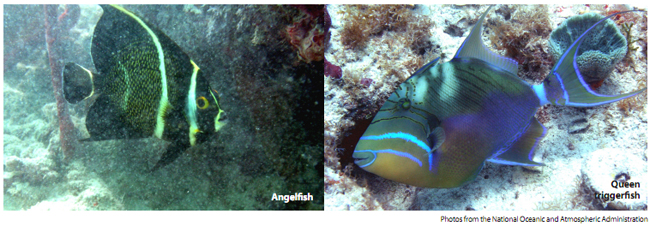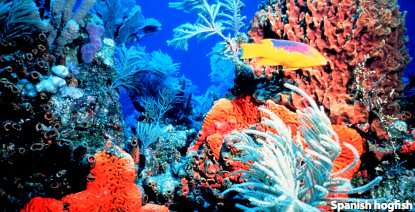Changing the Game: A New Approach to Prevent Overfishing in the Caribbean

Fishery managers approved sweeping new rules to prevent overfishing and protect species in the U.S. Caribbean from Puerto Rico to the Virgin Islands.
At Stake
New fishing limits cover more than 100 species, ranging from the popular spiny lobster to tropical reef fish such as honeycomb cowfish and queen angelfish. For most of these species, there had been no fishing rules in place to adequately limit the overall amount of fish removed from the ocean.
Why It's Needed
The proactive plan should help prevent overfishing by setting cautious limits before some fish populations potentially plummet to critically low levels. The strategy should avert tougher, more painful restrictions in the future by managing fish populations wisely now.
The idea is to avoid what happened with species such as Nassau grouper. The fish is in such severe trouble that a total fishing moratorium is in effect to save the species. Waiting for a crisis before acting is poor fishery management that has allowed overfishing to deplete too many valuable fish species, including 22 in the U.S. Caribbean alone. This new approach would put fishery managers ahead of the curve. They may better judge when species are declining so they can act in time. Limits can be adjusted as conditions change.
This comprehensive plan takes a big-picture look at fish and fishing, helps avoid problems in the future and sets the course for a healthy, balanced ocean ecosystem.
HOW IT WORKS
Keeping Track
The new system will keep a tighter rein on how many fish are caught. If fishermen catch more than permitted, managers may use a number of methods to keep future catch within permitted levels or make up for the excess, including reducing limits in the short term or establishing shorter fishing seasons. In the past, rules were weakly enforced for fisheries that had quotas and limits were routinely exceeded in some cases. With better control, the limits have a stronger chance of keeping fish populations healthy.

Islands Stand Alone
In the past, some bag, trip or other fishing limits applied to a handful of species. Those rules governed all fishermen in the U.S. Caribbean as a single group. But some fishermen complain it is unfair to have the same rules in different Caribbean regions because islands have varied ecosystems, ocean floor topography, species' conditions and fishing activities.
The new plan would consider the differences among the islands and set individual limits for Puerto Rico, St. Thomas/St. John and St. Croix.
The new method would give fishermen more opportunities to catch available fish in their areas while also allowing managers to keep a tighter rein on limits so they can maintain healthy fish populations.
Setting the Limits
In regions with a wide diversity of fish species and smaller fisheries, it may not be economically feasible to conduct a conventional stock assessment for each species. In those cases, information such as historic commercial and recreational catch numbers and basic biology can be used to establish catch limits to prevent overfishing. For stocks without a conventional stock assessment, scientists have recommended setting limits close to today's average catch with a cautious margin of error to ensure that enough fish remain for a healthy population. In some cases, fishermen probably will see little change.
How to Contact Us
For information, visit Pew at www.PewEnvironment.org/CaribbeanFish; Send e-mail to [email protected], or call project manager Holly Binns at 850.322.7845; or policy analyst Sera Harold Drevenak at 910.685.5705.
Send e-mail to the Virgin Islands Conservation Society at [email protected] or call 340.773.1989.
The U.S. Caribbean Fish Conservation Campaign
The Pew Environment Group is leading efforts to work with the Caribbean Fishery Management Council and the National Marine Fisheries Service to establish science-based annual catch limits by 2010 for species undergoing overfishing and by 2011 for all other species. The campaign works to bring scientific expertise to bear on fishery management plans and seeks common ground with fishermen to find solutions. The Pew Environment Group is the conservation arm of The Pew Charitable Trusts.
The Virgin Islands Conservation Society
VICS is a network of U.S. Virgin Islands conservation groups. VICS and its affiliates work to address a broad range of issues that impact coastal waters, coral reefs and fish populations, including pollution, development and energy projects.







